The new Selma? Activists say under DeSantis Florida is 'ground zero' in civil rights fight
WASHINGTON _ At first Salanda Benton didn’t think enough people were paying attention to what she felt was the unraveling of civil rights happening in Florida. It angered her, then saddened her as state officials banned books and restricted the teaching of Black history.
“I can’t believe it’s 2023 and we’re going through this,’’ said Benton, executive director of the Florida Coalition on Black Civic Participation. “There is not one day that we cannot have considered Florida to be the battleground…We’re in the belly of the beast.”
In recent weeks, more voting rights activists, faith leaders and civil rights advocates from across the country have joined Benton and other activists in Florida, which national civil rights leader Rev. Al Sharpton this week called “ground zero’’ in the modern-day fight for civil rights.
In urban and rural communities across Florida they have hosted town halls, led bus tours to historically Black colleges and universities and launched get-out-the-vote campaigns to focus attention on policies, such as book bans. Activists hope to oust some lawmakers, garner more national attention and apply enough pressure to reverse some policies they said roll back gains in civil rights. The fight, they said, is bigger than just Florida.
“The battle around book bans and censoring Black history, the battle around voting all resides in Florida,” Sharpton, president of the National Action Network, told USA Today. “I’m worried about if the template in Florida works…other governors, particularly Republicans, will see that as the playbook on how to run.”
Across the country, dozens of states mostly led by Republicans have adopted or proposed measures that critics say overlook critical parts of Black history or restrict language related to race, sexuality and gender issues in public schools. Some have also banned books, many that focus on race or sexuality.
“Florida is not the only place that this is happening,’’ said Gwendolyn Zoharah Simmons, a retired professor at the University of Florida. “It’s not even a Southern-based thing. This is already a national movement to roll back many of the gains that we have made from the Civil Rights era going forward, including voting rights (and) the teaching of real American history.”
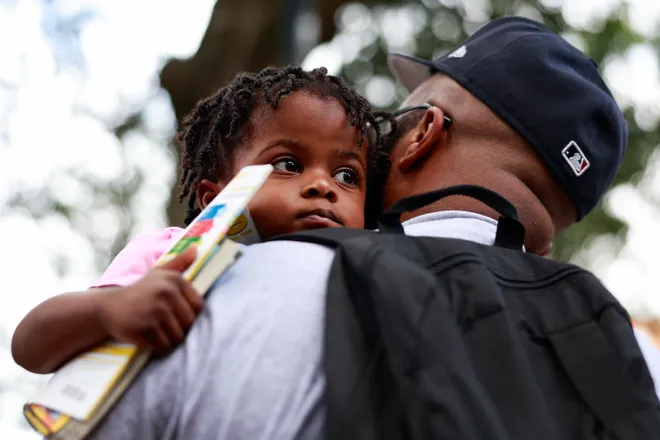
Others follow DeSantis' "anti-woke'' agenda
Florida's Republican Gov. Ron DeSantis, who is running for president, has led efforts across the state to embrace policies that restrict how certain topics, including race, sexuality and gender, are taught in schools and colleges.
The state also banned the College Board's Advanced Placement African American Studies course. Officials said some of the course material violates state law and take issue with the inclusion of lessons on the Black Lives Matter social justice movement, Black feminism and reparations.
Last year, DeSantis signed the Stop the Wrongs to Our Kids and Employees (W.O.K.E.) Act into law, which, among other things, limits how history can be taught. DeSantis has repeatedly said Florida is where woke goes to die.
Activists said they’re worried Florida’s policies could embolden even more states to adopt similar laws. And with DeSantis running for president, he has even more of a national platform, they said.
“He's made it very clear that he wants to make America, Florida…And that is a very bad thing,” said Jamil Davis, the Florida state organizing manager for Black Voters Matter.
The governor’s office did not immediately respond to a request for comment.
Dozens of states, including Texas and Oklahoma, have adopted or proposed measures that restrict Black history or ban some books. Proponents argue some books are offensive and that key parts of Black history are already taught in schools.
The movement is spreading and it will be hard to repeal laws, said Reginald Ellis, associate professor of History and African-American Studies at Florida A&M University.
Ellis said some of the ideology is showing up in states like North Carolina, which “signals that if there are not any barriers or if there are not any roadblocks or if they're not indeed stopped it will spread potentially to more of your moderately liberal states.”
Black churches in Florida buck DeSantis: 'Our churches will teach our own history.'
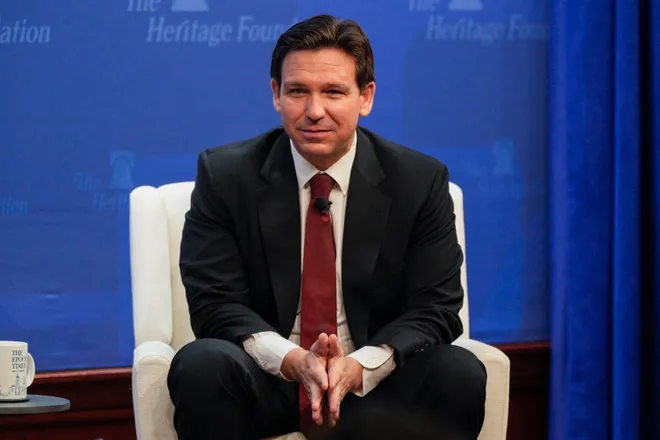
'We will not be erased"
Meanwhile, national civil rights organizations have teamed with local groups to counter Florida’s policies.
“It gives some kind of reinforcement to those locally that want to fight, but feel alone,” said Sharpton, who preached Sunday at Bethel Missionary Baptist Church in Tallahassee, Florida. Earlier in the year, the National Action Network led a protest outside the state capitol there.
Earlier this year, the Association for the Study of African American Life and History held its annual conference in Jacksonville, Florida where it featured a panel on teaching Black history and led a demonstration at a local park where people read excerpts from banned books.
In June, Black Voters Matter and others, including the Transformative Justice Coalition and the NAACP, launched its “Stay Woke Florida’’ bus tour across the state to raise awareness about what they called attacks on civil rights.
The goal is “to make sure that the voices of Black voters across the state of Florida are being heard, not just at the ballot box, but during this (upcoming) legislative session,’’ said Davis of Black Voters Matter.
In July, Faith in Florida, a coalition of churches advocating for social justice causes, launched an online toolkit, which includes books, documentaries and videos, to help faith groups across the state teach more Black history.
The NAACP branch in Tallahassee recently held a town hall on education, including the ban on books and the AP class. It plans to hold more, including one on voting rights.
In October, the National Coalition on Black Civic Participation kicked off its get-out-the-vote campaign in Florida with local groups stopping at historically Black colleges and universities during homecoming celebrations to register voters and share information. The “Power of the Ballot - We Will Not Be Erased: Vote 2024!!!’’ tour garnered local media attention.
“The whole goal was that people wake up and know that you’ve got a voice. That's our power,’’ said Benton, also Florida convener for the Black Women’s Roundtable. “We can't let nobody erase us and we cannot let nobody take our voice.” '
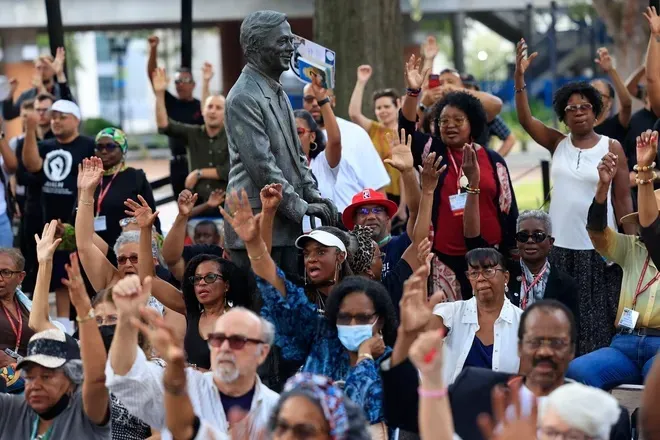
Conservative leaders banned books. Now Black museums are bracing for big crowds.
Black history 'Underground Railroad' forms across US after increase of book bans
'We fell asleep at the wheel'
Many of the regressive laws being adopted across the country didn’t start in Florida, but the state stands out for the way “anti-democratic leaning elected officials,” including DeSantis and state legislators, “are exercising their power to claw back rights for certain communities,” said William Roberts, senior vice president for Rights and Justice at Center for American Progress, a progressive-leaning think tank in Washington, D.C.
“Florida is doing it on a scale and at a pace that is different than others,” he said.
Experts said Florida Republicans, who control the legislature, picked fights over culture wars, which have become a rallying cry for conservatives.
Lawmakers have been emboldened to use culture wars to pass laws that ban books and curtail curriculum, Ellis of Florida A&M University said. “We are telling people what they can and can't say in public education,’’ he said.
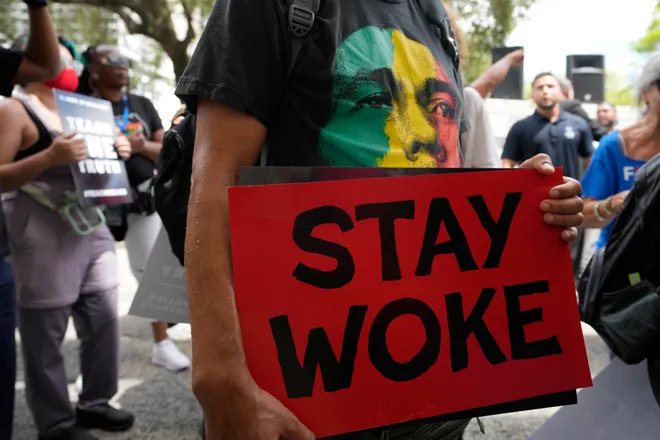
Opponents, meanwhile, were slow to respond, some activists said.
“We fell asleep at the wheel,” said Mutaqee Akbar, president of the Tallahassee branch of the NAACP, referring to Black communities and Democrats in Florida. “We haven’t showed up in years to vote.’’
Meanwhile, he said, DeSantis and other lawmakers have been very strategic in their efforts to adopt policies that, among other things, limit the teaching of Black history.
Simmons, who taught Black religion and African American studies at the University of Florida, agreed. "They caught us unaware,'' she said. “We’re in a death struggle for democracy.”
Ellis said the movement of the “intellectual white supremacist” started more than a decade ago. “They played the long game,’’ he said.
Akbar said he hopes the focus on Florida will “wake people up,’’ but he’s sure it also emboldens lawmakers proposing restrictions. “Other people that might be seeing this are saying, ‘Wow, if Florida is doing this we should be doing that too,’‘’ he said.
Sharpton likened the effort in Florida to when civil rights activists, including Martin Luther King, Jr., traveled to Selma and Birmingham in Alabama to battle segregation in the 1960s.
“Everybody understood that was ground zero and flew down there when they wanted to deal with the public accommodation,’’ he said. “We all have to deal with Florida. Florida volunteered and I accepted that.”
The fight for civil rights continues
The key to stopping the erosion of civil rights is to organize and challenge policies and laws, Simmons said. She said that includes campaigns to change the makeup of the Republican-controlled legislature.
“First, we have to wake the people up,’’ said Simmons, a veteran of the Student Nonviolent Coordinating Committee, who in the 1960s worked in Mississippi registering Blacks to vote. “We definitely want to be woke.’’
Roberts said it’s also critical that national groups support local organizations fighting to preserve those civil rights. “It’s important not to leave places like Florida behind,’’ he said.
Ellis said the effort must go beyond the 2024 election.
“As we saw from 2020 it has to be how do we wrestle back a more equitable America and to assure that it never gets out of whack again,’’ he said. “That is going to be this fight for the next 20, 30 years quite frankly.”
Sharpton said he plans to challenge some state policies in court and boycott corporations that eliminate diversity and inclusion programs. He said he will return to Florida later this to call out lawmakers who supported the measures.
“We can give them our Christmas gift,’’ he said. “When they hear somebody rattling the chimney it won't be Santa Claus it will be Sharpton.’’
Meanwhile, Benton said welcomes other activists coming to Florida to help.
“We cannot be separate moving forward against this enemy,’’ she said. “If you don't have no issues in New York then you need to bring your behind down here on a bus to Florida. If you’re doing good in Chicago, California, wherever you may be and you don't have any issues yet you need to be making sure that we kill this by unifying.”
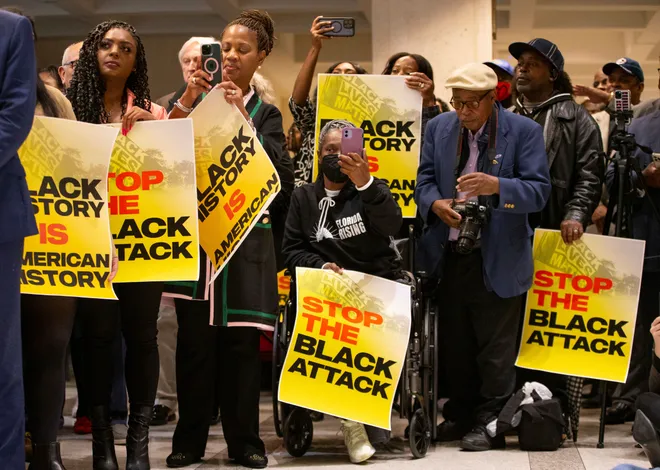
Disclaimer: The copyright of this article belongs to the original author. Reposting this article is solely for the purpose of information dissemination and does not constitute any investment advice. If there is any infringement, please contact us immediately. We will make corrections or deletions as necessary. Thank you.






